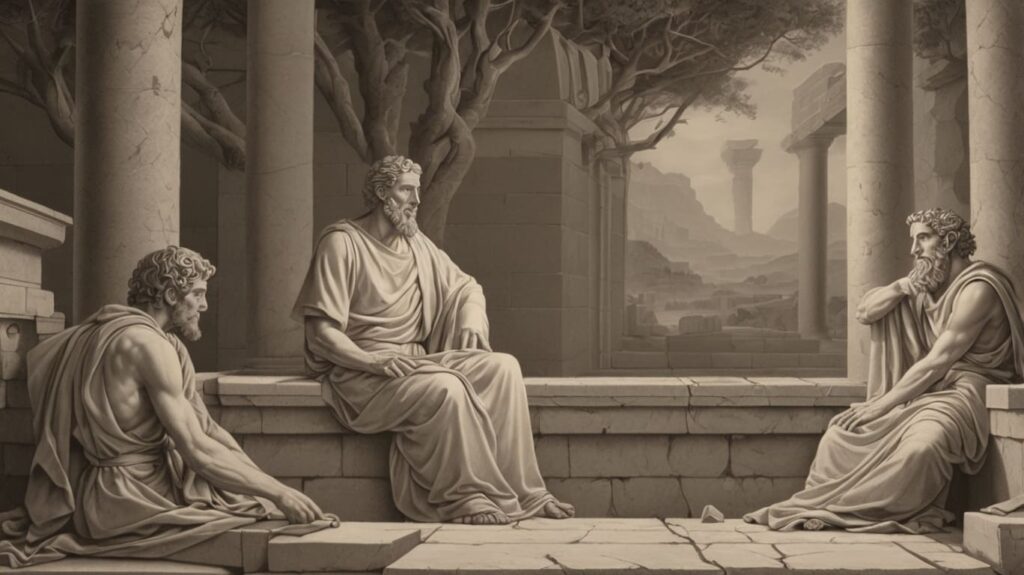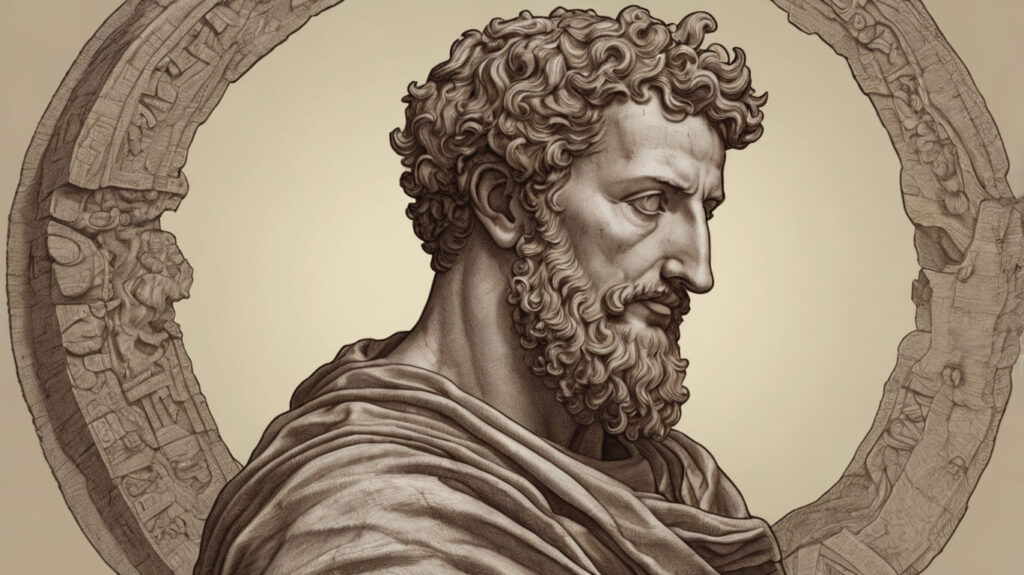Time is one of life’s most mysterious and precious resources. We are all granted a finite amount of it, yet we often squander it as if it were infinite. This paradox has captivated philosophers throughout the ages, including Marcus Aurelius, the Roman Emperor and Stoic thinker. In his seminal work, Meditations, he reminds us, “You could leave life right now. Let that determine what you do and say and think.” This profound realization emphasizes the fleeting nature of time and the necessity to use it meaningfully.
You could leave life right now. Let that determine what you do and say and think.
Marcus Aurelius
In this article, we delve into the essence of Aurelius’ wisdom: the inevitability of time slipping away and the responsibility we bear to use it wisely. By exploring Stoic principles, modern implications, and practical approaches to time management, we aim to unpack why living with intention and urgency is not only an act of self-fulfillment but also the ultimate path to freedom.
Time as a Nonrenewable Resource

One of the central ideas of Stoicism is the recognition that time, once lost, can never be reclaimed. Marcus Aurelius wrote: “You could be good today. But instead, you choose tomorrow.” This simple yet piercing observation points to a common human tendency: procrastination. People often delay pursuing their goals, believing there will always be time later.
Unlike material possessions or wealth, time cannot be replenished. Each passing moment brings us closer to the end of our allotted span. To waste it on trivial pursuits, grudges, or idle distractions is to squander the very essence of life. The Stoics understood this as a call to action—a reminder that time should be treated as sacred, with every moment bearing the potential for growth and meaning.
The Nature of Freedom in the Context of Time
Marcus Aurelius often linked time with freedom, positing that how we choose to spend our moments defines our liberation. True freedom, in Stoic terms, isn’t about external conditions or circumstances—it’s about mastery over your mind and actions. Wasting time, therefore, is not just imprudent; it enslaves us to regret, unfulfilled desires, and the consequences of inaction.
Freedom Through Virtue
The Stoic framework asserts that freedom is achieved by living a virtuous life aligned with reason. By directing our time toward cultivating wisdom, courage, justice, and self-discipline, we achieve a state of inner tranquility. Aurelius’ admonition to act now—to “free yourself”—is less about the fear of mortality and more about the opportunity to align each passing second with a purposeful life.
The Paradox of Modern Freedom
In our age, the concept of freedom is often conflated with endless choices and the ability to do as we please. However, this abundance can become a trap. The constant barrage of entertainment, notifications, and superficial goals pulls us away from intentional living. Aurelius’ insight invites us to reconsider: Are these distractions truly liberating, or are they stealing our most valuable resource—time?
Embracing Mortality: A Stoic Perspective
Marcus Aurelius’ Stoicism hinges on the principle of memento mori, or “remember you must die.” This meditation on mortality might seem somber, but it’s a powerful motivator for living a full and present life.

The Clock Is Always Ticking
Aurelius writes, “You may leave this life at any moment; have this possibility in your mind in all that you do or say or think.” This is not an exhortation to live in fear but a reminder to focus on what truly matters. Contemplating mortality sharpens our priorities and fosters a sense of gratitude for the time we have.
Avoiding Regret
Regret is one of the most pervasive and painful consequences of misused time. By failing to act decisively, pursue meaningful relationships, or align with our values, we set ourselves up for future remorse. Aurelius’ teachings encourage us to minimize regret by making intentional choices in the present, thus freeing ourselves from the burden of what could have been.
Practical Applications: Living the Wisdom of Marcus Aurelius
Understanding the philosophical underpinnings of Aurelius’ teachings is one thing; integrating them into daily life is another. How can we ensure that we use our time wisely and free ourselves from the shackles of distraction and procrastination?
Waste no more time arguing about what a good man should be. Be one
Marcus Aurelius
1. Prioritize the Essential
Aurelius famously urged his readers to strip away the unnecessary and focus on what truly matters. Ask yourself:
- What are my core values?
- Which activities align with my long-term goals?
- Am I spending too much time on trivial matters?
Eliminate or reduce activities that do not serve your higher purpose, whether that’s excessive screen time, gossip, or overindulgence in pleasures that yield no lasting fulfillment.
2. Practice Mindfulness
Being present in the moment is a key strategy for making the most of your time. When you’re fully engaged, time feels richer and more meaningful. Practices like meditation, journaling, or simply taking a few minutes to reflect on your day can cultivate mindfulness and prevent you from drifting through life on autopilot.
3. Act With Urgency
Aurelius reminds us that hesitation can be our greatest enemy. Whether it’s pursuing a passion, mending a relationship, or taking a bold step toward a goal, act now. Waiting for the “perfect moment” is often an excuse rooted in fear or indecision.
4. Cultivate Gratitude
Appreciate the time you have, even in its smallest increments. A daily practice of gratitude can help you recognize the beauty of the present and prevent you from fixating on the past or future. As Aurelius advises, “Take pleasure in the briefest of things that pass through you.”
5. Reflect and Adjust
Set aside time to evaluate how you’re spending your days. Are you aligning with your values? Are you progressing toward your goals? Regular reflection ensures you remain on course and adapt to changing circumstances.
Lessons for the Modern World
The wisdom of Marcus Aurelius is timeless, but its relevance is particularly striking in today’s fast-paced, hyperconnected world. Many people feel trapped by endless obligations, digital distractions, and societal pressures. Aurelius’ call to action offers a way out.

- Digital Minimalism: Limit time spent on social media and technology to reclaim focus and mental clarity.
- Work-Life Balance: Align your professional pursuits with personal fulfillment to avoid the regret of missed opportunities outside the office.
- Purpose-Driven Living: Identify what gives your life meaning, and make it the cornerstone of how you allocate your time.
In an era where busyness is often mistaken for productivity, Aurelius’ teachings remind us to slow down and reassess: Are we truly free, or are we shackled by our own distractions and misaligned priorities?
Breaking Down the Barriers
Marcus Aurelius’ reflections on time and freedom remain as poignant today as they were nearly two millennia ago. His admonition that time, once gone, never returns is both a warning and an inspiration. It urges us to live deliberately, aligning our actions with our values and focusing on what truly matters.
The responsibility lies with us to heed his wisdom. By embracing mortality, prioritizing the essential, and living with intention, we can transform fleeting moments into a life of purpose and freedom. The clock is ticking—will you use your time to free yourself, or let it slip away? The choice is yours.
Additional Resources
Here are additional resources to complement the article on Marcus Aurelius’ teachings about time and freedom, offering further philosophical and practical insights:
1. Stanford Encyclopedia of Philosophy: Marcus Aurelius
A comprehensive academic overview of Marcus Aurelius’ life, philosophy, and the central themes in Meditations.
Read more
2. The Daily Stoic: Stoic Lessons on Time
Explores Stoic principles related to time management and living intentionally, inspired by Aurelius and other Stoic philosophers.
Learn more
3. BBC Ideas: Philosophy and the Meaning of Time
A short, engaging video discussing how philosophers like Aurelius approached the concept of time and its impact on human life.
Watch here
4. Modern Stoicism: Applying Stoic Principles Today
Offers practical advice on integrating Stoic teachings, including those of Marcus Aurelius, into contemporary life for better time utilization.
Read the article
5. Psychology Today: The Timeless Wisdom of Marcus Aurelius
Examines the psychological aspects of Aurelius’ thoughts on time and how his philosophy aligns with modern mindfulness practices.
Explore here
These resources provide additional depth for readers interested in understanding and applying the timeless wisdom of Marcus Aurelius to their own lives.
Must Read : Memory Vaults in Modern Technology












